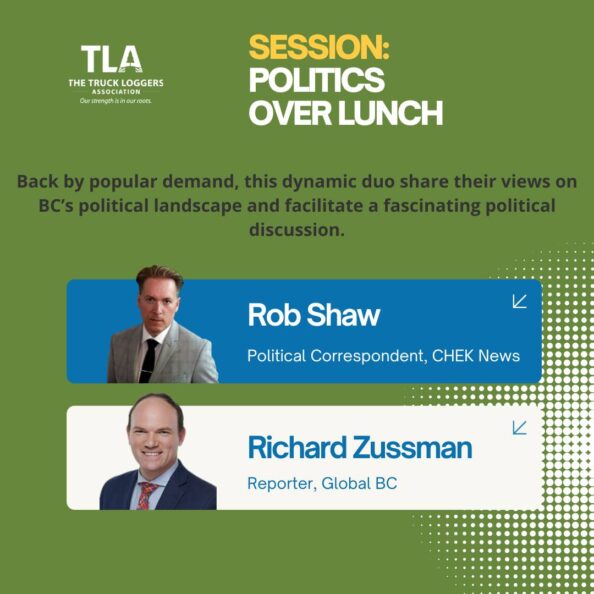 At the Truck Loggers Association (TLA) Conference, the Politics over Lunch panel brought together political correspondents Rob Shaw from CHEK News and Richard Zussman from Global BC. Moderated by Vaughn Palmer of the Vancouver Sun, the session offered an engaging exploration of British Columbia’s shifting political landscape and its implications for the forestry sector.
At the Truck Loggers Association (TLA) Conference, the Politics over Lunch panel brought together political correspondents Rob Shaw from CHEK News and Richard Zussman from Global BC. Moderated by Vaughn Palmer of the Vancouver Sun, the session offered an engaging exploration of British Columbia’s shifting political landscape and its implications for the forestry sector.
The panel delved into the dynamics of BC’s recent provincial election and its aftermath. Shaw highlighted the impact of the election’s tight results on Premier David Eby’s governing strategy. Despite securing a majority, Shaw described the NDP’s campaign as lacking inspiration and noted that some policies appeared reactive, adjusted in response to shifting public sentiment. This created an environment where Eby’s leadership style—once perceived as decisive—has been questioned. Zussman added that the Conservatives’ rise, despite internal challenges and a lack of political machinery, was a notable outcome. “The Conservatives came within striking distance of a majority,” he said, underscoring the shifting political currents in the province. The discussion emphasized how the political landscape’s unpredictability poses challenges for policy continuity, particularly in sectors like forestry.
The NDP-Green Forestry Review Agreement — One of the most discussed topics was the NDP-Green Party agreement, which includes a comprehensive review of BC’s forestry policies. Shaw noted that the NDP-Green forestry review agreement introduced uncertainty within the sector, and he questioned its necessity given past reviews and reports. He expressed frustration with the redundancy of the process, stating, “What in the world do you have to do another review for at this point?”
Zussman elaborated on the political context of the agreement, noting that it was likely a concession to the Greens to secure political stability. However, he warned that the review’s scope might undermine progress already made in sustainable forestry practices. “This feels more like political positioning than practical policy,” he remarked, urging the industry to actively engage in the process to ensure their concerns and advancements are recognized.
Palmer reflected on the broader implications of coalition politics. “This NDP-Green deal shows what happens when two MLAs, representing only 8% of the popular vote, get to dictate terms that affect the entire province,” he stated. He noted that the agreement’s focus on Indigenous involvement and environmental sustainability is crucial, but outcomes must be meaningful and actionable rather than symbolic gestures.

The panelists touched on several additional topics during the discussion, including the evolving role of provincial and federal policies in shaping forestry practices and the importance of maintaining public trust through proactive communication. They highlighted how political and economic shifts continue to create both challenges and opportunities for the sector, emphasizing that adaptability and engagement are critical for navigating this dynamic environment. The forestry sector’s ability to adapt to this new political landscape will hinge on its willingness to engage constructively with policymakers, advocate for balanced solutions, and demonstrate its value as both an economic and environmental ally.
The panel concluded with a discussion on how forestry stakeholders can better engage with the media to ensure their stories are accurately represented. Effective engagement begins with building relationships with journalists. By providing reliable, timely, and accessible information, stakeholders can foster trust and encourage balanced reporting.
Panelists stressed the importance of framing narratives in relatable and compelling ways. Highlighting the sector’s contributions to local communities, showcasing innovation, and maintaining transparency about challenges were identified as essential strategies. Addressing criticisms directly was also seen as a way to demonstrate accountability and rebuild public trust. Ultimately, the forestry sector has a strong story to tell, but it must take proactive steps to ensure that story reaches and resonates with its audience.
Drafted with the assistance of digital tools to streamline the process.